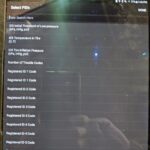The 2003 Jeep Grand Cherokee utilizes an OBD2 (On-Board Diagnostics II) system to monitor and report vehicle performance issues. Understanding these codes is crucial for diagnosing and resolving problems, ensuring your Jeep runs smoothly. This guide will help you understand how to retrieve and interpret OBD2 codes on your 2003 Grand Cherokee.
Retrieving OBD2 Codes on a 2003 Jeep Grand Cherokee
There are two primary methods for retrieving OBD2 codes on a 2003 Jeep Grand Cherokee:
1. Using an OBD2 Scanner: This is the most straightforward method. Plug a compatible OBD2 scanner into the diagnostic port located under the dashboard, typically near the steering column. The scanner will display the codes directly. This is the recommended method for accurate and detailed information.
2. The “Key Trick” Method:
-
With a Digital Odometer: Turn the ignition key to the “ON” position (do not start the engine) while simultaneously pressing and holding the trip odometer reset button. Release the button after a few seconds. The odometer display will cycle through a series of numbers and then display any stored trouble codes. Codes may begin with the letter “P”.
-
With an Analog Odometer (Less Common): If your 2003 Grand Cherokee has an analog odometer, this method might not work. However, you can try the older OBDI method: Cycle the ignition key ON-OFF-ON-OFF-ON within five seconds. The check engine light will flash a series of codes. Each code is a two-digit number represented by flashes (e.g., two flashes, a pause, then three flashes indicate code 23). A code 55 typically signifies the end of the code sequence.
Common 2003 Jeep Grand Cherokee OBD2 Codes
While a complete list of OBD2 codes is extensive, here are some common ones encountered in a 2003 Jeep Grand Cherokee:
- P0130 – P0161: Oxygen Sensor related issues
- P0300 – P0308: Misfire detection in one or multiple cylinders
- P0420: Catalyst System Efficiency Below Threshold (Bank 1) indicates a potential catalytic converter problem
- P0442: Evaporative Emission Control System Leak Detected (small leak) suggests a problem with the EVAP system
- P0455: Evaporative Emission Control System Leak Detected (gross leak) suggests a larger leak in the EVAP system
- P0700: Transmission Control System Malfunction indicates a general transmission issue; further diagnosis with a transmission specific code reader is needed.
Importance of Addressing OBD2 Codes
Ignoring OBD2 codes can lead to more significant problems and costly repairs. Addressing these codes promptly can prevent further damage to your vehicle and ensure its optimal performance.
Conclusion
Understanding your 2003 Jeep Grand Cherokee’s OBD2 system is vital for maintaining its health. While retrieving codes using the key trick method can provide some insights, utilizing an OBD2 scanner is highly recommended for accurate diagnosis. Always consult a qualified mechanic for complex issues or if you are unsure about performing repairs yourself. Regular maintenance and prompt attention to OBD2 codes will keep your Jeep Grand Cherokee running strong for years to come.


